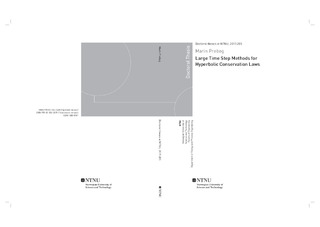| dc.contributor.advisor | Müller, Bernhard | |
| dc.contributor.advisor | Flåtten, Tore Halsne | |
| dc.contributor.advisor | Meese, Ernst Arne | |
| dc.contributor.advisor | Pelanti, Marica | |
| dc.contributor.author | Prebeg, Marin | |
| dc.date.accessioned | 2017-10-31T09:54:38Z | |
| dc.date.available | 2017-10-31T09:54:38Z | |
| dc.date.issued | 2017 | |
| dc.identifier.isbn | 978-82-326-2639-7 | |
| dc.identifier.issn | 1503-8181 | |
| dc.identifier.uri | http://hdl.handle.net/11250/2463112 | |
| dc.description.abstract | The HLL (Harten–Lax–van Leer) and HLLC (HLL–Contact) schemes are extended to LTS-HLL(C) schemes. The LTS-HLL-type schemes for scalar conservation laws are defined in the numerical viscosity, flux-difference splitting and wave propagation form, and TVD conditions on wave velocity estimates are determined. It is shown that the LTS-HLL-type schemes contain some already existing LTS methods such as the LTS-Roe and LTS-Lax-Friedrichs, and that they allow us to deduce LTS extensions of other methods, such as the Rusanov and Engquist-Osher methods. The LTS-HLL(C) schemes for systems of conservation laws are developed by standard field-by-field decomposition. Numerical results suggest that the computational efficiency of LTS methods depends on the type of problem under consideration. In certain cases LTS methods for nonlinear systems of equations yield increased accuracy, efficiency and convergence rate compared to standard methods.
Entropy stability of LTS-HLL-type schemes is analyzed. We use modified equation analysis to gain insight into numerical diffusion in LTS-HLL-type schemes and to conjecture about entropy stability of LTS methods. Theoretical results obtained through the modified equation analysis are in agreement with numerical results for both scalar conservation laws and the Euler equations.
Positivity preservation in LTS methods is investigated. We show that the positivity preserving conditions for LTS methods are stronger than for standard methods. We describe different ways positivity can be lost in LTS-HLL-type schemes for the Euler equations, and we propose a simple way to increase the robustness of the LTS-HLL-type schemes by adding numerical diffusion. Numerical investigations show that LTS-HLL-type schemes successfully handle test cases for positivity preservation, and where the positivity is lost we can improve the robustness by adding numerical diffusion.
In addition, we applied the LTS-Roe scheme to a two-fluid model and focused on the treatment of the boundary conditions and the source terms. It is shown that stability and accuracy of the solution can be greatly improved by appropriate treatment of boundary conditions and source terms. | nb_NO |
| dc.language.iso | eng | nb_NO |
| dc.publisher | NTNU | nb_NO |
| dc.relation.ispartofseries | Doctoral theses at NTNU;2017:285 | |
| dc.relation.haspart | Paper 1: M. Prebeg. “Numerical Viscosity in Large Time Step HLL-type Schemes”. In: Proceedings of the Sixteenth International Conference on Hyperbolic Problems, HYP2016 | nb_NO |
| dc.relation.haspart | Paper 2: M. Prebeg, T. Flåtten, and B. Müller. “Large Time Step HLL and HLLC schemes”
ESAIM: Mathematical Modelling and Numerical Analysis
https://doi.org/10.1051/m2an/2017051 | nb_NO |
| dc.relation.haspart | Paper 3: Prebeg, Marin; Flåtten, Tore; Müller, Bernhard. Large Time Step Roe scheme for a common 1D two-fluid model. Applied Mathematical Modelling 2017 ;Volum 44. s. 124-142
https://doi.org/10.1016/j.apm.2016.12.010 | nb_NO |
| dc.relation.haspart | Paper 4: M. Prebeg, T. Flåtten, and B. Müller. “Monotonicity and Positivity Preservation in Large Time Step Methods” | nb_NO |
| dc.relation.haspart | Paper 5: Prebeg, Marin; Flåtten, Tore; Müller, Bernhard. BOUNDARY AND SOURCE TERM TREATMENT IN THE LARGE TIME STEP METHOD FOR A COMMON TWO-FLUID MODEL. I: Eleventh International Conference on CFD in the Minerals and Process Industries CSIRO, Melbourne, Australia 7-9 December 2015. CSIRO Publishing 2015 | nb_NO |
| dc.title | Large Time Step Methods for Hyperbolic Conservation Laws | nb_NO |
| dc.type | Doctoral thesis | nb_NO |
| dc.subject.nsi | VDP::Technology: 500::Environmental engineering: 610 | nb_NO |
